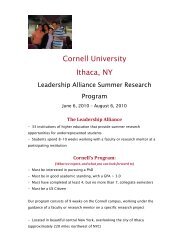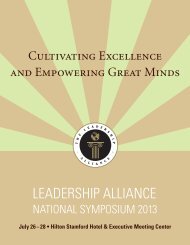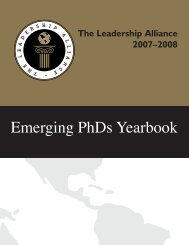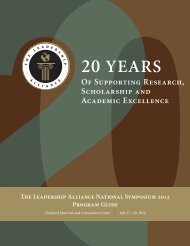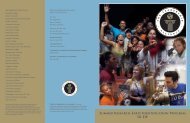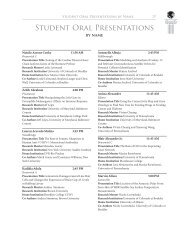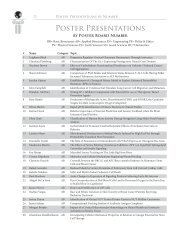Mentor Guide - The Leadership Alliance
Mentor Guide - The Leadership Alliance
Mentor Guide - The Leadership Alliance
You also want an ePaper? Increase the reach of your titles
YUMPU automatically turns print PDFs into web optimized ePapers that Google loves.
V.G.Ionova et al./ Proteomic studies of blood plasma of patients with the ischemic stroke in its most acute period<strong>The</strong> only exception was aggregation index (AI) that reflected a quantitative involvement oferythrocytes in the aggregation process. It was enhanced to 72.1%, but decreased to 49.7% with time.However, different picture was observed for the patient whose blood circulation was not restored afterthe systemic thrombolysis.This patient's aggregation data was, like of the other patients, normal. <strong>The</strong> only difference detectedwas the haptoglobin in the proteome of this patient's plasma, which was absent in patients with effectivetreatment.<strong>The</strong> positive dynamics of the parameters of the thrombocyte aggregation did not correlate with theneurological symptoms and expression of the 118-kDa protein that was found in all three samples of theblood plasma.Proteomic studies of blood plasma are a necessary initial step in a clinic analysis of acute disorders ofthe cerebral circulation and give an opportunity to choosethe key proteins the expression of which is changedin response to pharmacological agents or the brain ischemia.Our results can be used for elaboration of monitoring test-systems (biochips) for prognosis of theefficacy of thrombolytic therapy and for creation of new methods of treatment. <strong>The</strong>refore, the search forbiomarkers of the disorders in hemostasis and functions of a vascular wall is an urgent problem of practicalangioneurology.References[1] Ionova V. G., Kostyreva M. V.,Shabalina A. A., Tarchokova M. F., Lyutova L. V., Gornostaeva G. V., Varakin Yu.Ya. Specificity of rheology, haemostasis, fibrinolisis and lipid spectrum in patients with initial stages of cerebrovascularpathology. Thrombos, haemostasis, rheology 3, 47-54(in Russian).[2] Suslina Z.A., Tanashyan M.M., Domashenko M.A., Ionova V.G., Chechetkin A.O. Endothelial dysfunction inpatients with ischemic stroke. Annals of clinical and experimental neurology 2, (1), 4-11(in Russian).[3] Shevchenko A., Tomas H., Havlis J., Olsen J.V., and Mann M., 2006. In-gel digestion for mass spectrometriccharacterization of proteins and proteomes. Nat Protoc 1, 2856-2860.[4] Ratanasopa K., Chakane S., Nantasenamat C., Ilyas M., Bulow L., 2012. Trapping of human hemoglobin byhaptoglobin: Molecular mechanisms and clinical applications. Antioxid Redox Signal. Aug 19.[5] Chen R., Vendrell I., Chen C.P., Cash D., O'Toole K.G., Williams S.A., Jones C., Preston J.E., Wheeler J.X., 2011.Proteomic analysis of rat plasma following transient focal cerebral ischemia. Biomark Med. Dec, 5 (6), 837-46.[6] Andrew P. Levy, MD, PHD, FACC, Irit Hochberg, MD, Kathleen Jablonski, PHD, Helaine E. Resnick, PHD, ElisaT. Lee, PHD, Lyle Best, MD, Barbara V. Howard, PHD†, 2002. Haptoglobin Phenotype Is an Independent Risk Factorfor Cardiovascular Disease in Individuals With Diabetes: <strong>The</strong> Strong Heart Study.Journal of the American College ofCardiology, 40, 11.[7] Seon-Joo Park, Sang Hong Baek, Mi-Kyung Oh, Seung Hyun Choi, Eun Hye Park, Nam-Hoon Kim Jong-Chul Shin,In-Sook Kim, 2009. Enhancement of angiogenic and vasculogenic potential of endothelial progenitor cells byhaptoglobin.FEBS Letters 583, 3235–3240.[8] Rabea Asleh, Andrew P Levy, 2005. In vivo and in vitro studies establishing haptoglobin as a major susceptibilitygene for diabetic vascular disease.Vascular Health and Risk Management 1(1),19–28.[9] Funmei Yang, Jill L. Brune, W. David Baldwin, Ron R. Barnett, Barbara Bowman, 1983. Identification andcharacterization of human haptoglobin cDNA. Proc. Natl. Acad. Sci. USA 80,5875-5879, October Biochemistry..[10] Bonetti P.O., Lerman L.O., Lerman A. et al., 2003. Endothelial dysfunction. A marker of atherosclerotic risk.Arterioscler. Thromb. Vasc. Biol. 23, 168–175.[11] Adams H., 2007. <strong>Guide</strong>lines for the management of adults with ischemic stroke. Stroke 2007, 38,1655-1711.[12] <strong>Guide</strong>lines for the management of ischemic stroke of the European stroke organization, 2008/2009 http://www.esostroke.org/recommendations.[13] Rha J-H, Saver J.L.,2007. <strong>The</strong> impact of recanalization on ischemic stroke outcome.A Meta-analysis. Stroke, 38,967 - 973.[14] Joshua D Schlautman, Wojciech Rozek, Robert Stetler, R Lee Mosley, Howard E Gendelman and PawelCiborowski, 2008. Multidimensional protein fractionation using ProteomeLab PF 2D for profiling amyotrophic lateralsclerosis immunity: A preliminary report. Proteome Science 6, 26.63
ROLE OF A MENTORAlthough an eight- to ten-week research experience isbrief, there is potential to have a consider able impacton your mentee. One of the key characteristics to asuccessful mentoring experience is the willingness toguide, instruct and assist students to reach their researchobjectives. Beyond serving as an advisor or supervisoron a research project, the mentor takes an active interestin the student’s academic and professional developmentas a budding scholar. <strong>The</strong> ideal mentor seeks to quicklyestablish a positive working relationship with the studentto promote confidence, student inquiry, focus anddiscipline. This is an opportune time for mentors toprovide insight into both the specific discipline and thenature of academic careers. In the SR-EIP, the mentor’sresponsi bilities can be divided into three parts: your roleprior to the start of the program, your role upon thestudent’s arrival and your role at the end of the summer.Prior to Arrival of the Student1. Assess your student’s interests, knowledge andability. <strong>The</strong> program administrator shouldprovide you with a copy of your student’sapplication so that you may familiarize yourselfwith the student’s coursework, researchexperience and interests.2. Develop a tentative project or proposal.3. Contact your student via phone or e-mail towelcome them and discuss the proposed project.4. Provide or suggest some preparatory readingmaterial.5. If your student will be working primarily with agraduate student or postdoc, explain this to thestudent.6. Make sure there is adequate space for the studentto work.3
7. Designate a contact person to manageadministrative details and emergencies.8. Arrange training for the student in the health,safety and ethical requirements for working inyour facility.9. <strong>The</strong> summer program administrator on yourcampus should inform you of the program’srequirements and expectations of the student.Share this information with the graduate studentsand postdocs who will be working with the student.10. Within the SR-EIP, the <strong>Leadership</strong> <strong>Alliance</strong>has developed discipline-specific initiativesand partnerships to provide enrichment and asupportive network for students. <strong>The</strong> summerprogram administrator will inform you of additionalcommitments these might require of your student.Recognize that your student may be nervous aboutmeeting you. By contacting your student prior to thebeginning of the program, you can begin to put themat ease while you learn more about their interests andbackground. Providing information in advance about yourarea of research will facilitate your student’s initiation ofa research project. Thorough preparation prior to thebeginning of the program will convey a positive messageto your new student.Upon Arrival of the Student• Meet with your student during the first week todiscuss the project and expectations. Take thetime at this initial meeting to clearly define yourexpectations and make sure the logic and rationaleof the project is clear to your student. Developand adhere to a schedule of regular meetingswith your student (and co-mentors, if applicable).Ideally, meetings should occur at a fixed time atleast once per week.• If you are not on campus for a period of time,continue to keep in touch with your student viae-mail or phone.Integrate your studentinto your daily activitieswhenever possible.4
• Make an effort to get to know your student onan informal basis by sharing lunch at least onceover the course of the summer. In addition todeveloping a more personal relationship, you canuse this time to advise your student about graduateschool, career options, course selections, etc.• Talk about various issues associated withchoosing and preparing for graduate school andwhat it means to be an academic. Discuss careeroptions with your student and the importanceof making the most of their remainingundergraduate studies.• When possible, include your student in someof the day-to-day tasks of your professionalresponsibilities, i.e., grant writing, staff meetings,data analyses, editing journals, etc.• Each <strong>Leadership</strong> <strong>Alliance</strong> student is expectedto make either an oral or poster presentation atthe <strong>Leadership</strong> <strong>Alliance</strong> National Symposium atthe end of July. Review the presentation data thestudent will use, and, if possible, help your studentprepare presentation materials. If your studentelects to give a poster, try to set aside some timeat least a week before the symposium to stagea mock poster presentation. If your student isplanning an oral presentation, it would be help fulto assemble a small audience to critique it.Regular communication with your student isa fundamental element of a successful summerresearch experi ence. Do not let a week pass withoutcommunicating with your student at least once; if youcan’t meet face-to-face, talk on the phone or send ane-mail. Do not underestimate the value of informalconversation – these can be productive and revealingexchanges. Involving your student in some of yourprofessional activities is an excellent way to convey asense of academic life.Students appreciatehonest criticism andhelpful suggestions.5
At the Conclusion of the Program• Provide your student either a written or oralappraisal at the final meeting of the programand offer advice about course selection, careerchoices and graduate program options.• Offer to write letters of recommendation forother research opportunities as well as graduateschool applications. If your student workedprimarily with a graduate student or postdoc,elicit their assistance in writing the letter.• At the end of the program, you will receive anonline link to an assessment form (see AppendixA) for providing feedback on the student’sperformance and any suggestions you have forimproving the program overall. <strong>The</strong> programadministrator may forward your comments tothe student’s advisor at the home institution.It is very important for students to receive constructivecriticism of their performance during the summer. <strong>The</strong>sample assessment provided in Appendix A can be usedas a guide for providing feedback and comments in yourappraisal meeting with the student. Be aware that yourobservations about the program and your experience as amentor are highly valued by the program administratorand the <strong>Leadership</strong> <strong>Alliance</strong>.6
COMMUNICATING EFFECTIVELYSuccessful navigation of the mentor-mentee relationshiprequires the establishment of effective communication fromthe start. As a mentor, you must be sensitive to issues ofrace, ethnicity, culture, gender and academic preparation.• Do not make assumptions about prior knowledgeby under- or overestimating academic skills andabilities. Regularly encourage your student to speakup if something—or someone—is not understood.• Your student may come from an environment thatprovides a “hands-on” style of mentoring with veryspecific direction. <strong>The</strong> student may be reluctantto admit that they are not accustomed to actingindependently.Promptly communicateany problem to programadministrators.• Do not hesitate to give critical feedback whennecessary.• Be a good listener.• Promptly communicate to program administratorsany problem that may arise with your student sothey may resolve the issue as quickly as possible.• Get to know your student. Learning about yourstudent’s origins and sharing information aboutyour own will contribute to a mutual understanding.7
MENTORING STUDENTS IN THE SCIENCES<strong>The</strong> culture that surrounds the student doing scientificresearch often involves working in a laboratory aspart of a team. Assessing your student in advance andhelping them to acclimate as quickly as possible toyour laboratory environment will set the stage for aconstructive summer.Orientation• Use the first week to explain the project, considerrelevant background literature and reviewtechniques, including computer software. Makesure your student receives any necessary formaltraining in laboratory safety, in accordance withyour institution’s requirements.Hold your student tohigh standards but don’tforget he/she is a novice.• Develop a tentative schedule for completion ofvarious aspects of the project, and discuss thehours your student is expected to maintain.• Clearly explain the rules for keeping a laboratorynotebook and other lab records.• Outline your student’s role in lab meetings andany other required meetings or seminars.• Explain the role of the graduate student orpostdoc as mentor.If a postdoc or senior graduate student is assigned toco-mentor and supervise the student, explain this. Makesure the student clearly understands the role of otherindivi duals in the lab. <strong>The</strong> student should know towhom various questions should be addressed and oughtto feel comfortable relying on a lab colleague for certaintypes of assistance.8
Selection of this individual is crucial to the overallexperience of the summer intern. Be sensitive to culturalissues and misunder standings that may occur betweensummer intern and the postdoc or graduate student. Havethe postdoc or graduate student become familiar withthe philosophy and goals of the SR-EIP by sharing thisbrochure and your views about mentoring under graduates.Formulating a Research Project• It is essential that students are supplied withsome materials to familiarize them with yourfield of research as well as your lab’s researchgoals and techniques prior to arrival. Continue toencourage them to read relevant materials duringthe course of the summer.When selecting agraduate student orpostdoc to directlysupervise your student,carefully consider gender,culture and languagedifferences.• Your student should conduct work that relates toa specific aim of the research goals of your lab.Identify a project with a clearly definable goal andscope that can be reasonably attained within thespan of eight to ten weeks.• Whenever possible, include your student in theformulation of the underlying hypotheses andexpected outcomes of the experiments. Make surestudents are thoroughly trained in the appropriateset of techniques and understand their relevanceto the project.• It is important that your student understands theproject’s relevance to the broader scientific goals ofthe lab, as well as the lab’s overall contribu tions toits scientific field. This can be discussed in regularmeetings with the student while reviewing theirprogress in the lab or the assigned literature.9
• Do not assign a project that depends on a singletechnique, given the possibility that the techniquemay not work.• You should anticipate alternate approaches orparts of the project to assign to your student in theevent that he or she becomes stuck on the originalassignment. Considering alternatives in advancewill help ensure that the student has a meaningfullab experience and relatively little “downtime.”• In selecting a project, remember that yourstudent will be sharing their results at a nationalconference, and likely discussing the project ingraduate school applications.Asking QuestionsIt is essential that your student learns how to askquestions that will yield a greater understanding of thework conducted in your lab. Suggest that your studentwrite down questions and bring them to share duringregular meetings.• Stress the importance of asking appropriatequestions, particularly during critical periods, inorder to move the research forward.• Strive to create an atmosphere that makes astudent feel empowered to ask questions, andreassure your student that it’s okay to ask all kindsof questions. Do not make them feel inferiorwhile learning to formulate better questions.<strong>The</strong>re is no such thing as a “bad” or “dumb”question, particularly in research!• Do not hesitate to ask hard questions of yourstudent but do not forget that they are still anovice in your discipline and may lack some basicacademic preparation.• Help the student to read literature critically,and to identify the strengths and weaknessesin a publication.10
MethodologiesDiscuss various methods of scientific investigation withyour student. Keep in mind that students with limitedresearch experience may not be familiar with diversemethods of inquiry.• Ask students explicitly about research methodsthey may have used in the past and question themabout their understanding of methods they willuse in the summer program.• Cite examples of the kinds of methods andtechniques that can be used to address researchquestions.• Instructing a student in laboratory techniquesshould include an explanation of the techniques,not simply a demonstration.From a mentor:”I think career counseling is the most important take-homelesson. Very few students have a realistic understanding of whata scientist does for a living as compared to other professionssuch as a doctor, dentist or shoe salesman. Within a short timeafter rotating in the lab, they will be making decisions aboutattending graduate school, or not. I hope they get a glimpse ofthis and other career paths that one can take with a Ph.D. I hopethey see how the job changes over time and are somewhat betterinformed and therefore more confident that this is what theywant to do for the next forty years of their lives. I do hope theysee frustration and failure and learn whether they need instantgratification from their work to be satisfied.”11
MENTORING STUDENTS IN THEHUMANITIES AND SOCIAL SCIENCESSummer research in the humanities and social sciencesis distinctly different from laboratory-based researchexperiences. Because of the independent nature ofthe research, students need to clearly under standthe expectations inherent in this environment. Somesocial science research environments (e.g., those thatinvolve administering surveys or running subjectsthrough research protocols) share some similarities withlaboratory-based research environments, so you may findsome helpful suggestions in the previous section.Clearly articulateyour expectations atthe beginning of theprogram.OrientationResearch in the humanities and social sciences is oftenconducted in libraries, going through primary andsecondary sources and sorting through information thatmay yield potentially interesting data. It entails significantamounts of time spent on one’s own, wrestling withthe research question, writing and interpreting data.Keep in mind the following suggestions for prepar ingand supporting students as they work independently.• At the initial meeting, work with your studentto develop a research plan that includes shorttermand long-term goals as well as a timeline forcompletion of the work.• Inform your student realistically about howfrequently you will be able to meet with themand when. If you have a heavy travel schedule orwill be away for a significant length of time, makesure the student is aware of this. Provide waysto ensure the student can continue to receivefeedback while you are away, e.g., viae-mail or phone calls.12
• Tell students that it is their responsibility tocontact you if they need anything. Remind themthat independent, self-directed work often defineshumanities and social sciences research but itdoes not mean that they should not seek help ifthey are confused or unsure about the direction oftheir research.• Discuss the resources that are available to thestudent as they pursue independent researchduring the summer. Mention the services offeredin university libraries and explain the roles ofarchivists, reference librarians, informationtechnology experts, database managers and curators.<strong>The</strong> program coordinator will make arrangementsfor the student to meet with these professionals.• Let your student know how often you will providefeedback and be explicit about the level of criticismto expect (detailed and extensive vs. sparse).• Discuss the level and the amount of writing thatis expected over the course of the summer, and letthem know the number of drafts you expect.Formulating a Research ProjectStudents may arrive with a specific research project inmind or they may simply have a broad interest in the field.You must help the student define a project that is realisticwithin the given time frame of the research program butwill also allow the student to be introduced to the depthand breadth of the available literature.• Listen carefully to the student’s perspective aboutthe kind of research they wish to pursue over thesummer. Ask the student to share an article oressay as an example of the work they would like todo. Question your student about familiarity withthe available literature to help you gauge theirknowledge of the field.13
• If appropriate, discuss ways in which race,gender, sexual orientation, ethnicity, socioeconomicstatus and other characteristicshelp to expand the types of questions askedin a particular discipline and the variousmethodologies used for answering them.• Your student should have a clearly definedresearch project by the end of the second week ofthe program so they have adequate time to pursuethe work in appropriate depth over the summer.It is critical that students come up with a fewresearch questions they can realistically addresswithin the timeline you’ve established together.• Once the project has been defined, help yourstudent assemble a reading list to provide somedirection and guidance. Although you may havea particular bias about the research, you shouldprovide competing hypotheses and divergenttheories. Help your student understand howdiverse perspectives have come about and pro videexamples of how their research can be placed inthe context of these different perspectives.Asking Questions• Discuss with your student the importance oflearning to ask appropriate questions, particularlyduring critical periods, in order to move theresearch forward.• Do not hesitate to appropriately challengeassumptions held by your student about theirresearch topic but remember that your student isstill a novice in your discipline.• Encourage your student to write down all ofthe questions they have and bring them toshare during regular meetings. Be open toexchanging ideas with your student. Strive tocreate an atmosphere that makes a student feelempowered to ask questions. Help your studentlearn to formulate better questions but do notmake them feel inferior while doing so.14
• Model how to ask questions within the context ofthe discipline. Help the student clearly delineatethe different levels of questions and the kinds ofquestions to ask during the research process. Forinstance, broad research questions need to behoned down to specific questions related to the dataor information found, which may in turn lead todifferent levels of analyses and additional questions.• Research in the humanities and social sciencesrelies on the ability of the investigator to poseinsightful questions and then find the appropriateprimary and secondary resources necessary toanswer these questions. Students must recognizethat their questions may require understanding ofa wider variety of disciplines than they may haveoriginally considered.See Appendix Bfor a summary ofresponsibilitiesfor mentors in thehumanities andsocial sciences.MethodologiesResearchers in the humanities and social sciencesutilize a wide variety of both qualitative and quantitativemethods in their research. It is important for you todiscuss the appropriate methodologies currently used inyour discipline as well as the wide variety of qualitativeand quantitative methods. Keep in mind that studentswith limited research experience may not be familiar withdiverse methods of inquiry.• Ask students explicitly about research methodsthey may have used in the past and question themabout their understanding of methods they mayuse in the summer program.• Provide a variety of examples of the kinds ofmethods that can be used to address researchquestions. You may also wish to provide readingsthat contain examples of how various researchmethods have been used by other researchers.• If using survey instruments, archival materials orlarge databases, arrange for your student to meetwith appropriate professional staff for training inthe use of these resources.15
SUMMARY OF LEADERSHIP ALLIANCEEXPECTATIONS• Design a manageable project that can beaccomplished over the course of the summer.• Meet at least once a week with your student tomonitor progress and provide guidance.• Review the data your student will use in apresentation for the <strong>Leadership</strong> <strong>Alliance</strong>Symposium at the end of July, and if possible,help your student prepare the presentation.Review data used inyour student’s finalpresentation to ensureits accuracy.• If you experience any difficulty with your student,bring it to the attention of the summer programadministrators on your campus as soon as possibleso they may help to resolve the issue.• If satisfied with the student’s performance, offerto provide letters of recommendation. If you areasked to write a recommendation, indicate to thestudent what you plan to write.• Give your student a written or oral appraisal atthe final meeting of the program and offer adviceabout course selection, career choices and graduateprogram options.• Complete the online assessment form forwardedto you by the <strong>Leadership</strong> <strong>Alliance</strong> ExecutiveOffice (see Appendix A).CONCLUSION<strong>The</strong> <strong>Leadership</strong> <strong>Alliance</strong> is deeply grateful for yourcontribution of time and effort expended to mentor ourstudents. <strong>Mentor</strong>s are the cornerstone of the SummerResearch-Early Identification Program, and your hardwork and dedication are sincerely appreciated.16
APPENDIX A: MENTOR’S PERFORMANCE APPRAISAL OF STUDENTBriefly describeResearch Performed by StudentPlease rate the student from 5=Excellent to 1=Needs Improvement or N/A.Knowledge ApplicationAbility to apply knowledge to project activitiesAbility to use knowledge in solving problemsAbility to search independently for and apply knowledge from online, library sourcesor co-workersKnowledge of literature and basic concepts of disciplineKnowledge of current issues in disciplineProblem-Solving SkillsAbility to identify a problem as a member of a certain class of problemsAbility to see underlying connections between concepts from different subject areasAbility to generate possible options to resolve problemResearch SkillsAbility to design and conduct tests or analysesLab record keeping and data gatheringUse of quantitative/qualitative techniques and methods for data gatheringUse of laboratory equipmentFollowing laboratory safety proceduresUse of computer applications for data analysesAbility to analyze resultsPreparation of research reports/presentationsTeamwork SkillsAbility to give and receive constructive criticismAbility to take charge of, and complete, assigned tasksActive participation in research discussionsEthics and ProfessionalismDemonstrated understanding of ethical responsibilitiesDemonstrated understanding of professional responsibilitiesBriefly describeAreas of StrengthAreas that Need Improvement and Suggestions on How to Improve17
APPENDIX B: SUMMARY OF MENTOR RESPONSIBILITIES IN THEHUMANITIES AND SOCIAL SCIENCES<strong>The</strong> faculty mentor is a central figure in <strong>Leadership</strong> <strong>Alliance</strong> summer programs.<strong>The</strong> mentor’s responsibilities include:1. Supervise and <strong>Guide</strong> the Student’s Research Project<strong>The</strong> mentor is responsible for overseeing the student’s research project. <strong>The</strong> projectshould acquaint the student with the procedures that scholars follow in a selecteddiscipline.• Assist the student in conceiving a project, planning it, and seeing itthrough to completion.• Schedule regular periods of contact for review of the project.• Evaluate the project.• Assist student with the development of a scholarly bibliography andreading list related to the selected topic.• Assist the student in developing a presentation for <strong>The</strong> <strong>Leadership</strong> <strong>Alliance</strong>National Symposium.2. Help the Student Prepare for Graduate School<strong>The</strong> mentor is responsible for sharing their graduate school decision making process andsharing information about graduate study at their institution.• Help the student to meet with department chairs and graduate school recruitersat their institution.• Review the graduate school decision-making process.• Advise the student on their academic plans for completion of the undergraduatedegree and graduate school requirements• Discuss with the student the nature of graduate study.• Help the student understand the nature of a positive mentor/mentee relationship.3. Serve as a Link between the Student, Program and Home Institution• Participate in an orientation.• Alert the program coordinator to any questions or problems that arise.• Assist the coordinator in monitoring the progress of the student andin evaluating activities.• Submit a final evaluation of the student’s progress at the end of the summer.18
PREPARED FOR THE LEADERSHIP ALLIANCE BYSharon Gamble, Columbia UniversityLiza Cariaga-Lo, Yale UniversityFrancoise Freyre, Cornell Weill Graduate SchoolJudy Jackson, University of PennsylvaniaWilliam Moore, Southern University at Baton RougeRoosevelt Ratliff, Claflin UniversitySara Tortora, Brown UniversityRevised in 2011 by the Publications Committee:Cheryl Apprey, University of VirginiaMichelle Grundy, Vanderbilt UniversityO.W. Johnson, Tougaloo CollegeBarbara Kahn, Brown UniversityMichelle Nearon, Yale UniversityJohn Rose, Hunter CollegeJane Seibel, Dartmouth CollegeEditorial revisions in 2013 by the <strong>Leadership</strong> <strong>Alliance</strong>Executive Office© 2004, 2011, 2013 <strong>The</strong> <strong>Leadership</strong> <strong>Alliance</strong>.All Rights Reserved.
<strong>The</strong> <strong>Leadership</strong> <strong>Alliance</strong>Member InstitutionsBrooklyn CollegeBrown UniversityChaminade University of HonoluluClaflin UniversityColumbia UniversityCornell UniversityDartmouth CollegeDillard UniversityHarvard UniversityHoward UniversityHunter CollegeJohns Hopkins UniversityMontana State University-BozemanMorehouse CollegeMorgan State UniversityNew York UniversityPrinceton UniversitySpelman CollegeStanford UniversityTougaloo CollegeTufts UniversityUniversity of ChicagoUniversity of Colorado at BoulderUniversity of Maryland, Baltimore CountyUniversity of MiamiUniversity of PennsylvaniaUniversity of Puerto RicoUniversity of VirginiaVanderbilt UniversityWashington University in St. LouisXavier University of LouisianaYale UniversityNovartis Institutes for BioMedical Research (Associate Member)www.theleadershipalliance.org<strong>The</strong> <strong>Leadership</strong> <strong>Alliance</strong> ~ Box 1963133 Waterman StreetProvidence, RI 02912401-863-1474



